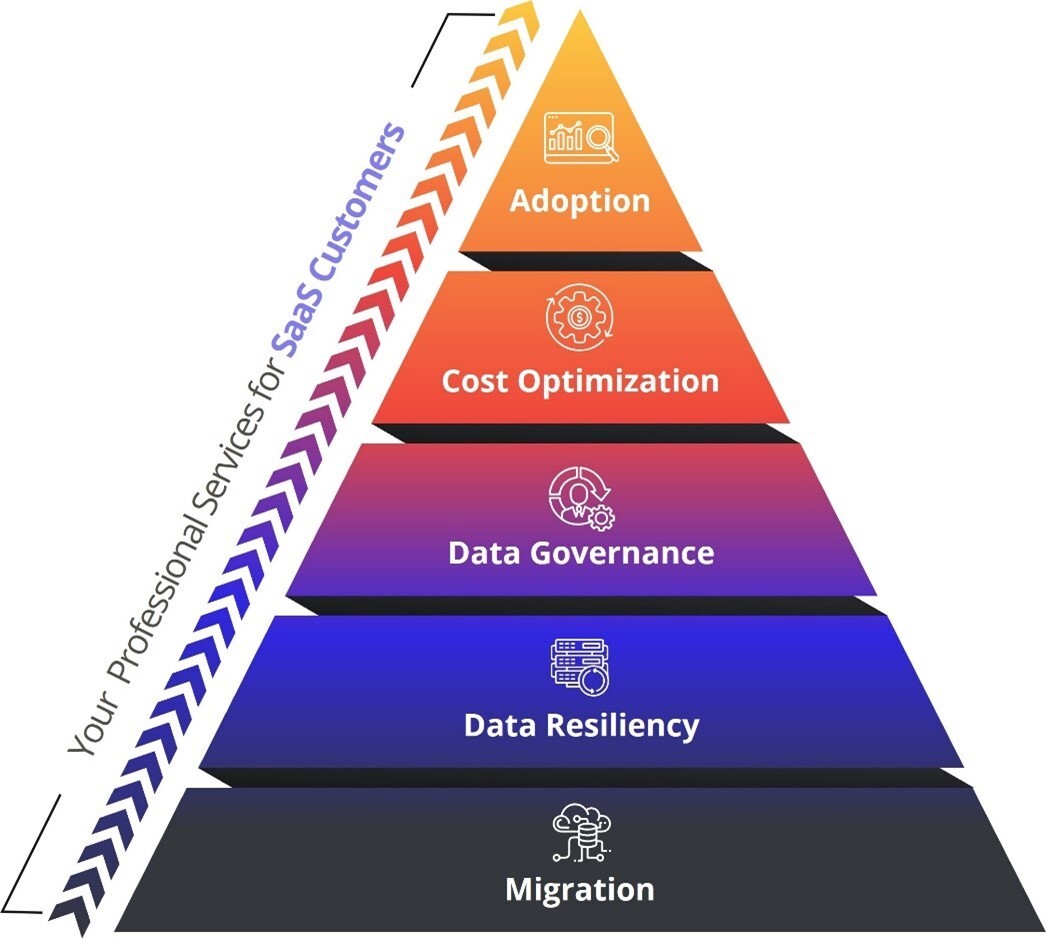The Ultimate Guide to Building a Profitable Cloud Practice for MSPs

Small and medium-sized businesses (SMBs) increasingly invest in cloud services, with 55% spending between $600,000 and $12 million annually. This substantial financial commitment underscores the critical role that cloud solutions play in modern business strategies and operations, presenting a significant opportunity for Managed Service Providers (MSPs) to enhance their service offerings and boost profitability.
According to a recent survey, the top services provided by MSPs include cloud migrations, cloud backup and protection, and digital collaboration governance solutions. These services are not just in high demand but are also essential for SMBs looking to stay competitive in a rapidly evolving market.
For MSPs, aligning their offerings with the evolving needs of SMBs can position themselves as indispensable partners in the digital transformation journey.
5 Steps to Ensure a Profitable Cloud Practice
How can MSPs effectively capitalize on this growing demand for cloud services? This blog post outlines the essential steps to building a profitable cloud practice.
1. Define Service Offerings
To build a profitable cloud practice, MSPs must first define their service offerings based on current market trends and customer needs.
For example, many businesses have begun utilizing AI, and 92% of businesses that haven’t integrated AI tools yet believe it will help improve their business, and are actively considering implementing an AI tool into their operations. MSPs can leverage this opportunity to help enable AI for businesses, ensuring that their digital infrastructure is ready and secure as they implement AI.
In fact, according to Cisco, 92% of organizations require new techniques to manage data and risks in line with using generative AI tools. This is because AI relies heavily on data; businesses’ data must be accurate and properly organized to maximize the value of AI. MSPs can offer services focused on AI readiness, covering data governance and security solutions, to assist businesses in setting up the framework for effective AI utilization.
Research also indicates that cloud migration services are in high demand, with IDC predicting that 30% of SMBs will shift half of their core workloads to the cloud by 2025. Additionally, data breaches involving cloud data have become a significant concern, with 82% of breaches in 2023 related to cloud environments. Addressing these pain points with reliable solutions can help MSPs attract and retain clients.
Identifying these trends can help offer services that address specific cloud pain points. For instance, the increasing adoption of hybrid cloud environments presents an opportunity for MSPs to offer hybrid cloud management services. Additionally, with the rise of remote work, there is a growing demand for secure and efficient digital collaboration tools. By staying abreast of these trends, MSPs can tailor their service offerings to meet the evolving needs of their clients.

2. Optimize Operational Efficiency
Profitability in cloud services also hinges on operational efficiency. MSPs should consider partnering with a vendor that offers a unified platform approach, enabling them to scale from siloed solutions to cohesive service models. This approach streamlines operations and reduces costs, leading to better profit margins. MSPs can enhance service delivery and build stronger, strategic relationships with their clients by choosing a single vendor that addresses various customer pain points.
Operational efficiency can be further enhanced by leveraging automation tools and technologies. Automation can help MSPs streamline routine monitoring, reporting, and patch management, freeing valuable time for more strategic activities. Additionally, adopting a proactive approach to maintenance and support can help prevent issues before they arise, reducing downtime and improving customer satisfaction.
For example, implementing a centralized management system can provide real-time insights into the health and performance of clients’ IT environments. This allows MSPs to quickly identify and address potential issues, ensuring minimal disruption to clients’ operations. Furthermore, standardizing processes and procedures across the organization can lead to more consistent service delivery and improved efficiency.
Profitability also relies on keeping operating costs low to maximize profit margins. Consider a vendor that provides a platform approach focused on unified data. This allows you to scale from siloed solutions to cohesive service models, optimizing your operations.
3. Strategize on Pricing
Effective pricing strategies are crucial for maximizing profits. MSPs can adopt various pricing models, such as flat fees billed per device or user, tiered pricing based on service comprehensiveness, or value-based pricing depending on the scope of services. Regularly reviewing and adjusting pricing strategies based on market trends and competitor analysis is essential to remain competitive and profitable.
To further elaborate, MSPs should thoroughly analyze their cost structures and market positioning. This involves understanding the value proposition of their services and how they compare to competitors. For example, offering bundled services at a discounted rate can attract more clients and increase overall revenue. Additionally, a subscription-based pricing model can provide a steady income stream and improve cash flow management.
Another effective strategy is to offer flexible pricing options that cater to clients’ diverse needs. For instance, providing pay-as-you-go plans or usage-based pricing can appeal to clients with varying budget constraints. By offering a range of pricing options, MSPs can attract a broader client base and increase their market share.
4. Build a Skilled Team
A skilled team is the backbone of any successful cloud practice. With 58% of global decision-makers facing challenges in finding skilled cloud professionals, MSPs have a unique opportunity to fill this gap. However, 90% of companies prefer to hire individuals with relevant certifications. Therefore, MSPs should focus on recruiting professionals with specific cloud skills and certifications and provide ongoing training and certification opportunities to keep their teams’ skills current.
MSPs should invest in continuous learning and development programs to build a skilled team. This includes offering access to industry-recognized certifications, attending relevant conferences and workshops, and providing hands-on training opportunities. Additionally, fostering a culture of innovation and collaboration can help attract top talent and retain valuable employees.
5. Invest in Marketing and Sales Efforts
Effective marketing and sales strategies are vital for attracting and retaining clients, with 36% saying the relationship between their marketing and sales teams is tightly integrated across all touchpoints. MSPs should invest in social media advertising, search engine advertising, and email marketing to reach their target audience. To enhance targeting, it's crucial to learn how to find email addresses to better connect with potential clients.
Additionally, offering services beyond transactional relationships and demonstrating how MSPs can solve customers’ problems and help them fully adopt necessary technologies can drive sales. Sharing success stories and case studies can further showcase the MSP’s capabilities and the benefits of their services.
Enhance your MSP Cloud Practice with AvePoint
Building a profitable cloud practice requires a strategic approach that includes defining high-demand service offerings, optimizing operational efficiency, adopting effective pricing strategies, building a skilled team, and implementing robust marketing and sales efforts. By following these steps, MSPs can enhance their service offerings, attract more clients, and boost profitability.
The AvePoint Partner Program can significantly enhance an MSP’s ability to create a profitable cloud practice through rebates and discounts, training and support, and marketing and sales resources services, helping MSPs expand their service offerings and improve customer satisfaction.
Join the AvePoint Partner Program today and take your MSP services to the next level.
As Vice President of Content & Communications at AvePoint, Chris is responsible for all external and internal corporate marketing communications. Chris brings more than 15 years of experience to his role at AvePoint, previously holding roles at EisnerAmper, BASF, MetLife and CRM Magazine. Chris received two American Society of Business Publication Editors (ASBPE) awards for feature articles on salesforce.com and generational trends.






